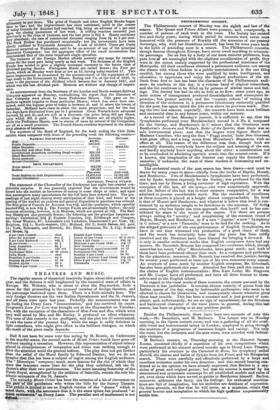PHILHARMONIC SOCIETY.
The Philharmonic concert of Monday was the eighth and last of the season. The Queen and Prince Albert were present; and, consequently, a number of persons of rank were in the room. The Society has existed five-and-thirty years; during which period its concerts were never Once honoured with the presence of Royalty till the accession of our present Sovereign, who, with her illustrious consort, has been for some years back in the habit of attending once in a season. The Philharmonic concerts, though famous throughout Europe, have never owed anything to aristocra- tic patronage. Set on foot by a body of our most eminent professors, from pure love ef art unmingled with the slightest consideration of profit, they
were in the outset mainly supported by the professional musicians of the Metropolis, till their excellence obtained a permanent audience, not among
the classes with whom fashion in a public entertainment is the one thing needful, but among those who were qualified by taste, intelligence, and education, to appreciate and enjoy the highest productions of the art. Such from first to last has been the character of the Philharmonic audi- ence: ita nucleus, to this day, is a veteran band of original subscribers, and the list continues to be filled up by persons of similar tastes and feel- ings. The Society has had its ebb as well as its flow: some years ago, an inert course of management produced dissatisfaction and consequent de- pression; but greater activity, and the " organic reform " of vesting the direction of the orchestra in a permanent functionary eminently qualified for the post, has again raised the tide even above its previous mark. Dur- ing the two last seasons, especially, the concerts have been more brilliant and successful than in any former years, within our memory.
As a record of last Monday's concert, it is sufficient to say, that the Symphonies performed were Mendelssohn's second in A No. 2, composed for the Society, and Beethoven's in C minor; that the Overtures were Beethoven's Leonora and Weber's Ruler of the Spirits; that there was no solo instrumental piece; and that the singers were Signor Mario and Madame Castellan, who sang the duet" Fuggi crudel," from Don Giovanni, with great effect, and a long se,ena from Meyerbeer's Huguenots, with no effect at alL The reason of the difference was, that, though both are essentially dramatic, everybody knew the subject and meaning of the one, and hardly anybody knew anything about the other: a consideration not to be overlooked in admitting operatic music into the concert-room. If it is known, the imagination of the listener can supply the dramatic, ac- cessories; if unknown, the want of these renders it unmeaning and un- intelligible.
The orchestral music of the past season has been drawn—and must be drawn for many years to come—chiefly from the works of Haydn, Mozart, and Beethoveu. Two of Mendelssohn's Symphonies have been performed; one by Spohr, written expressly for the Society, was produced for the first time; and one by Hesse, a living composer of high reputation. With the exception of this last, all the symp...,aies were unanimously approved; and the failure of the last was in some measure comparative for it was admitted to possess considerable merit. But the standard Of excellence at these concerts is placed at a height almost unapproachable. Its level is that of Mozart and Beethoven; and whatever is below that level is con- demned by an audience taught to be fastidious in the extreme. Of living composers, who but Spolir can even approach that level? and he has con- tributed his share to the music of the season. Yet there are persons always calling for "novelty," and complaining of the constant round of Haydn, Mozart, and Beethoven as if a new "Jupiter," a new "Symphony in C minor," or a new "Pastorale," were to be had for the seeking. As to the alleged grievance of the non-performance of English Symphonies, we have in our time witnessed the production of a good many of them, and the result has invariably been that the piece has been coldly received and the Directors have been blamed for bringing it forward. It is only in smaller orchestral works that English composers have had any success. Mr. Sterudale Bennett has composed two overtures which, though somewhat too much " after " Mendelssohn, have great merit; and both of them have been performed oftener than once. As a composer and performer for the pianoforte, moreover, Mr. Bennett has received due justice; having for several years performed at least one of his own concertos every season. An overture of some merit by another English composer, Mr. Griesbaoh, has also been performed this year. Attention has been paid this season to the claims of English instrumentalists: Miss Kate Loder, Mr. Blagrove, and Mr. Cooper, have all performed, and have all done honour to them- selves and to the English school.
In regard to the vocal music of these concerts, the course pursued by the Directors is less justifiable. It consists almost entirely of pieces from the Italian operas of the day, sung by fashionable performers; who seem to be allowed to choose for themselves, and consequently choose whatever gives them least trouble. This has been a constant and a just ground of com- plaint; and, unfortunately, we see no sign of amendment; for the frivolous and hackneyed character of the vocal pieces in general, during this last season, has been as glaring as at any previous period.


























 Previous page
Previous page